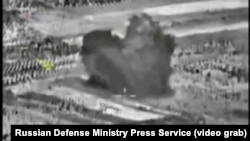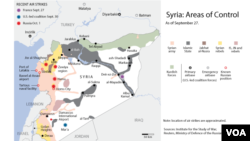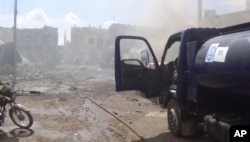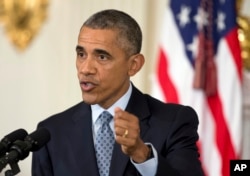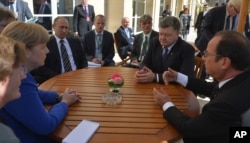Russia said Sunday its forces continued "intensifying" airstrikes against Islamic State targets in Syria, and that the bombings have disrupted the group's infrastructure and logistical support.
A Ministry of Defense statement said Russian warplanes struck 10 Islamic State targets in the previous 24 hours, including training camps, arms depots and command posts.
Most of the strikes were located in Idlib province in western Syria, while others hit near the de facto Islamic State capital of Raqqa.
The Britain-based Syrian Observatory for Human Rights reported additional suspected Russian airstrikes Sunday in Homs and Hama, areas located south of Idlib.
Russia pledged Saturday to boost the aerial campaign it began late last week despite questions and criticism from Western governments that say Russian jets are largely bombing rebels opposed to Syrian President Bashar al-Assad and not Islamic State fighters.
Video from Syrian opposition groups showed victims of what they claimed were Russian airstrikes on the towns of Telbiseh and Rastan.
Syrian opposition leader Khaled al Khoja claimed most of the Russian attacks were aimed at what he called “moderate” opposition targets.
Russian intervention
Arabiya TV reported Khoja called for the United Nations and Arab League to help halt the Russian intervention.
Appearing on Syrian TV, Assad defended the Russian military operation he authorized last week.
Assad said the (Russian) operation must succeed or the entire region faces destruction. He said the price of victory will no doubt be heavy, but if countries stop supporting what he called terrorists, it would hasten the end of the conflict.
Russian analyst Viacheslav Matuzov told Syrian TV Russia does “not distinguish between a 'moderate' or 'non-moderate' opposition. Russia only recognizes the Syrian government army, he insisted, and other armed factions are illegal, according to international law.
The director of the Fares Center at Tufts University's Fletcher School of Law and Diplomacy, Nadim Shehadi, told VOA Russia's real goal is to unravel U.S. interests in the region.
"The target is U.S. influence and policy, so ultimately they are driving the United States out of the region. What Russia has done is intervene against U.S. interests ... (along with Iran)," Shehadi said.
Shehadi insisted Russia “has no intention of hitting the Islamic State.”
'Backing the butcher'
British Prime Minister David Cameron reiterated his opposition Sunday, saying he welcomed Russia's help in the yearlong campaign to fight the Islamic State group, but that achieving security in the region will require an alternative to Assad's government.
"What is happening is that they are backing the butcher Assad, which is a terrible mistake for them and for the world," Cameron told BBC. "It's going to make the region more unstable, it will lead to further radicalization and increased terrorism, and I would say to them, change direction."
Britain's defense chief said Saturday that only 5 percent of Russia's airstrikes had targeted the extremists.
On Friday, U.S. President Barack Obama insisted the conflict is not going to become a "proxy war" between Washington and Moscow, even as the two countries conduct airstrikes on different groups inside Syria.
"This is not some superpower chessboard contest," Obama said at a White House news conference.
At the same time, he was critical of Russia's military engagement in Syria, calling it a "recipe for disaster."
The president noted that the Russians do not distinguish between Islamic State militants "and a moderate Sunni opposition that wants to see Assad go. From their perspective, they're all terrorists."
The Syrian government has long referred to the rebels as "terrorists" as well.
Obama said this lack of distinction will have consequences for the Syria that emerges from the conflict, because the moderates will be needed to help run the country.
Obama said the U.S. will continue its current policies of attacking the Islamic State group, supporting Syrian moderates and working with the Turks along the border – and above all, seeking a political solution, which he said will “not be easy” but is “still possible."
Political solution
Putin, French President Francois Hollande and German Chancellor Angela Merkel discussed Syria during a peace summit on Ukraine Friday.
Hollande said afterward that he told Putin Russian airstrikes must target Islamic State and only Islamic State.
In a speech Friday at the U.N. General Assembly, Syrian Foreign Minister Walid Al-Moualem said his government would participate in U.N. working groups to reach a peace deal, but also said it could not implement democratic reforms related to elections or the constitution while "fighting terrorism."
Efforts to find a resolution to the Syrian crisis have faltered for 4½ years as the conflict spiraled from government crackdowns against protesters into a civil war and later a multifaceted fight with rebels, extremist groups and the military all battling each other.
Since March 2011, the conflict has killed more than 240,000 people and forced nearly 12 million others from their homes.
Ed Yeranian contributed to this report from Cairo.




